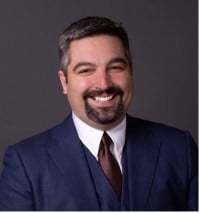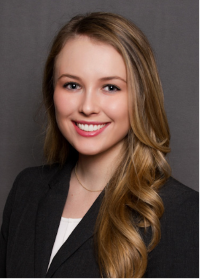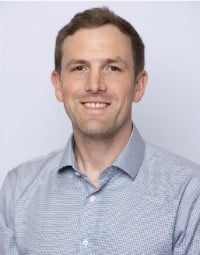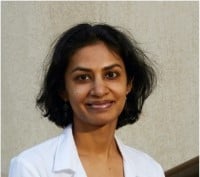The EMRA Research Committee interviewed 4 soon-to-be legends in the emergency medicine research community, from residents to established faculty, to understand their experiences. Our interviewees — Mat Goebel, MD, MAS; Corey Hazekamp, MD, MS; Vinitha Jacob, MD, PhD; and Laura Harding-Jackson, DO, PhD — discussed how they got their start in EM research, relevant training, current focuses and niches, and more.
Interviewees

Mat Goebel, MD, MAS
Dr. Goebel is an emergency physician and former paramedic, EKG tech, and sound engineer. Originally from the San Francisco Bay Area, he graduated from medical school at the University of California at San Diego, where he also obtained a master of advanced studies degree in clinical research. He went on to complete emergency medicine residency at UMass Chan Baystate Medical Center. He remained at Baystate to complete an NIH-funded research fellowship, during which he obtained an additional certificate in clinical and translational research from Tufts University. Dr. Goebel is currently an EMS fellow at Baystate. His clinical and research interests include EMS, STEMI, cardiac arrest, EKGs, cybersecurity, natural language processing, data visualization, and applications of machine learning.

Laura Harding-Jackson, DO, PhD
Dr. Harding-Jackson is a 1st-year emergency medicine resident at the University of Michigan. She completed her dual-degree at Michigan State University College of Osteopathic Medicine, where she studied neuroelectrophysiology. She loves EM and is interested in combining her background in neurophysiology with emergency medicine, including seizures, stroke, and anoxic brain injury.

Corey Hazekamp, MD, MS
Dr. Hazekamp is a senior emergency medicine resident at NYC H+H/Lincoln. He completed medical school at the University of Illinois College of Medicine at Rockford and was previously a researcher at the Lurie Children’s Hospital of Chicago. His current research interests are in health-care disparities, health equity, and substance use disorders, including social determinants of health like eviction and youth development.

Vinitha Jacob, MD, PhD
Dr. Jacob is a clinical assistant professor and former K12 Scholar in the department of emergency medicine at the University of Michigan. She focuses on the development and repurposing of sepsis therapeutics and biomarkers using preclinical models including in zebrafish model systems. She obtained her undergraduate degree in chemical engineering from Princeton University and her MD and PhD degrees from the Icahn School of Medicine at Mount Sinai. She completed her residency in emergency medicine at Yale New Haven Hospital.
EMRA Research Committee: How did you get involved in research?
Dr. Goebel: While I was working as an ED tech, I got involved with data abstraction for QI. I took an interest in driving change with data. The chair of research for the ED took me under his wing to get involved with several research projects, and the rest is history!
Dr. Harding-Jackson: I became involved in research during my freshman year of college. My first job was actually working in a greenhouse for a lab studying virus spread among biofuel crops. I learned that I loved the scientific method and the lab atmosphere, and I later found my way to a biomedical sciences lab, which is where I discovered my love of medicine.
Dr. Hazekamp: I became interested in research as an undergraduate at the University of Colorado where I researched the genetic variability of Rocky Mountain bighorn sheep herds which led to my first research grant — a National Science Foundation Research Experience for Undergraduates award. This is a fully funded award meant to enable undergraduate researchers to engage in mentored research for a whole summer, which prompted my interest in graduate school. Originally intending to complete a PhD, during graduate school, I became interested in medicine and pivoted to medical school, where I fostered my passion for research focusing on public health.
Dr. Jacob: I was involved in research from a young age, in high school, and continued to stick with it! My early exposure to molecular biology and bench research was eye opening, and I was able to continue this work as it applies to emergency medicine.
EMRA Research Committee: What sort of formal and informal training have you had relevant to your research work?
Dr. Goebel: I took a gap year during med school to get a masters in clinical research from UC San Diego. Following residency, I did a 1-year research fellowship, during which I got a certificate in clinical research from Tufts.
Dr. Harding-Jackson: I completed my PhD during medical school through a combined DO-PhD training program. Having PhD experience, while not necessary to be involved in research as a resident, has been very helpful in facilitating involvement with more basic science research.
Dr. Hazekamp: My formal research training was primarily in basic science research; however, I also had informal training in epidemiology, which consisted of basically reading interesting manuscripts and putting together research projects. Since starting residency, I was fortunate enough to have been chosen for a National Institute on Drug Abuse-funded, Society of Academic Emergency Medicine Foundation (SAEM)-sponsored, mentor-facilitated training award, which provides direct experience in researching solutions for substance use disorders through a mentor-guided project. Currently, I am participating in the SAEM ARMED course, which teaches junior researchers about various research techniques and the intricacies required to apply for NIH funding.
Dr. Jacob: I have a PhD in biomedical sciences and did a K12 research fellowship.
EMRA Research Committee: What is the focus of your current initiatives? How did you find/are you finding your niche?
Dr. Goebel: I am mainly focused on prehospital research, especially pertaining to STEMI and the use of AI. I just chased what I found interesting. I was originally an EKG tech working on STEMI metrics, and I continued to find interest in that area.
Dr. Harding-Jackson: As a 1st-year resident, I am just getting started in the emergency medicine research world! I first connected with a few potential mentors during interview season. After I joined the residency program, we met to discuss project ideas that would be feasible with a busy residency schedule. While becoming comfortable in clinical training was my top goal for intern year, it was helpful to explore opportunities for research involvement. I just began a project evaluating markers of neural recovery in anoxic brain injury, and I am excited to see where the work takes us! There is always a component of mentorship to finding this as well. Seek out a mentor who will foster and support your passion and excitement for a subject!
Dr. Hazekamp: Of course, research is my outlet from the rise and grind of clinical emergency medicine. Currently, my research focuses on how to improve how we treat opioid use disorder in the emergency department, though I'm expanding my scope to include substance use disorders in general. Even as a medical student, it was apparent that we can improve how we treat substance use disorders in the emergency department. EM researchers have produced some practice-changing data in the past 3 years. It's an exciting time to be involved in this area of EM research.
Dr. Jacob: I make preclinical models of sepsis and inflammation to test drug candidates. I was able to do so by looking out to see what problems/topics interested me in residency and spending that time to reflect on what sort of research I liked and didn’t like.
EMRA Research Committee: What motivates you?
Dr. Goebel: I want to use data to drive patient-care improvements. Also, I will always be chasing the dopamine hit of getting my first publication.
Dr. Harding-Jackson: I am curious by nature and I love discovering new things! Knowing that a project that I designed or led improved our knowledge of a subject is so rewarding. When it comes to medical research, improving knowledge of a disease process or treatment can mean improving the quality of life for patients to come.
Dr. Hazekamp: I find research and scholarship to be a mechanism that allows me to avoid burnout in emergency medicine. I was taught early on that establishing a personal niche can prevent burnout. One thing I love about research in general is coming up with a research question, formulating a research plan and carrying out the work all the way to publication. Seeing my ideas and thoughts in a peer-reviewed publication provides immense personal satisfaction and gives me professional gratification.
Dr. Jacob: Mostly, I just inherently love it and am driven by curiosity. I also want to make an impact on sepsis care.
EMRA Research Committee: What skills do you think are most important in emergency medicine research? How have you been gaining those skills?
Dr. Goebel: I think having some level of coding skills can really set you apart. When you are asking people to get you data, they generally assume you want the data all neat, tidy, and ready to use. Data doesn't come that way, and cleaning the data is a LOT of work. With some basic skills in R you can say, “Hey just give me the raw data and I'll take care of it.” People are VERY willing to help you. Same when you work with a statistician. You can say, “I have clean data. I just need help running the right tests.” This also lowers the barrier to people being willing to help you.
Dr. Harding-Jackson: Accountability and proactivity are certainly important skills that come to mind. Working on a research project is very different from a class project. Instead of being given assignments to complete, you design the assignments yourself and then complete them. Holding yourself accountable for the work takes significant self-motivation and discipline, especially during a busy residency schedule. Organization and careful planning are key to managing these commitments.
Dr. Hazekamp: Organization and patience. In my experience, being prepared and organized can make or break a research project.
Dr. Jacob: Persistence, resilience. Learn by doing it. Seek additional training as needed, and find mentors and colleagues who can teach you something.
EMRA Research Committee: What are some challenges (expected or unexpected) that you’ve encountered in your path to research, and how have you overcome them?
Dr. Goebel: Securing grant funding is much much much harder than I expected. Also there is so...much...writing. And I've discovered I don't really like writing, which is a huge (personal) barrier.
Dr. Harding-Jackson: It can be difficult to make time for research while also fulfilling your role as a medical student or resident. Overcommitment and time management can be major challenges. I make sure to communicate with my mentors early and often to keep them updated on my current schedule and appraised of any conflicts.
Dr. Hazekamp: Focusing on one question. Sometimes I get so excited about an idea that I have trouble narrowing down my thoughts to a single question that I want to answer.
Dr. Jacob: Unexpected results, experiments that don't work out. You have to keep focused and not get dismayed. All results are meaningful.
EMRA Research Committee: What advice would you give to folks who want to get started in research, but don’t have an EM research infrastructure at their institution?
Dr. Goebel: Feel free to cold email and direct message folks at other institutions who are working in areas that you like!
Dr. Harding-Jackson: Most residency programs will have a point-person to help residents become involved in research, as a scholarly project is a residency requirement. This is a great place to start! Let them know that you are interested in a project and ask if they can point you toward an appropriate mentor. If this is not an option at your program, I would recommend connecting with other residents who do research to ask these questions. You may also search the NIH database for individuals with national grant funding to find active projects with contact information for the lead investigator.
Dr. Hazekamp: Every institution should have an institutional review board (IRB). I would figure out what you will need to get a project approved by the IRB. Keep your research question focused and narrow. Recognize your limitations. Start with a project that is achievable within 1-2 years. Most importantly, find a mentor.
Dr. Jacob: Find ideas/topics that are interesting to you, and talk to others at your institution and even outside of your institution about your thoughts to find mentors.
EMRA Research Committee: What last advice would you give medical students and residents interested in research?
Dr. Goebel: Make friends with the people doing quality improvement or compliance. They are using 80% of the same skills, and know how to get data.
Dr. Harding-Jackson: 1) Don't be afraid to ask: Email physicians or professors and let them know why you are interested in their work. Ask about possible involvement! 2) Communicate: Always reach out when you are having trouble meeting a deadline or have a conflict arise, student/residency schedules are busy, and most mentors are very understanding of this. 3) Be engaged: Show your mentors that you are excited about the research by asking questions and engaging in conversation about the studies. You do not need to have an MS or PhD in order to be successful in a physician-scientist career path. If you love the science and are motivated to pursue it, you will find opportunities!
Dr. Hazekamp: Find a mentor. The experiences, knowledge, and skills I've gained from active mentorship have been invaluable. Focus on a topic you enjoy. You'll need to read through a lot of literature; no one wants to read papers on a topic that isn't exciting to them. EM is a broad field. There are a million things you can research — find something that gets you excited.
Dr. Jacob: Be a closer — someone who is able to see things through and get your projects across the finish line. This is how you’ll gain trust of your collaborators and mentors and be able to get from idea to publication. The only projects that matter are the projects that are taken to the end and published or shared in some way. Just get started; you learn by doing!
Want to learn more? Check out our EMRA March Madness event recording here and visit our Research Committee homepage here.



